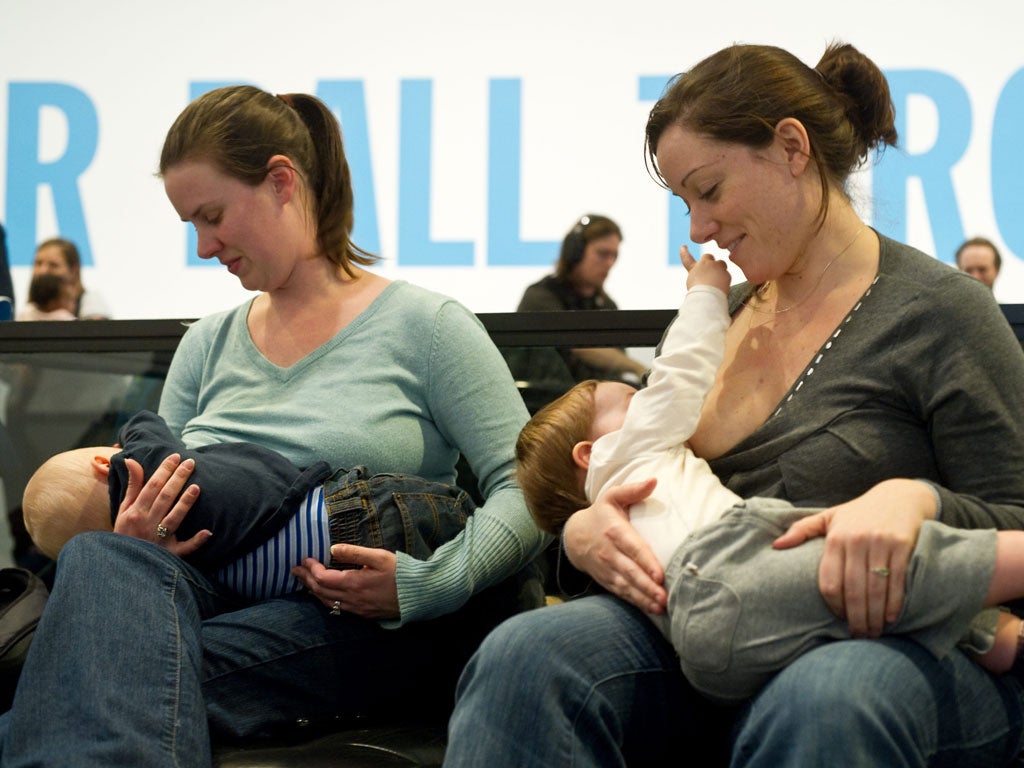Let mothers breastfeed - wherever they choose
A fall in breastfeeding harms the nation's health, and increases NHS spending


Your support helps us to tell the story
From reproductive rights to climate change to Big Tech, The Independent is on the ground when the story is developing. Whether it's investigating the financials of Elon Musk's pro-Trump PAC or producing our latest documentary, 'The A Word', which shines a light on the American women fighting for reproductive rights, we know how important it is to parse out the facts from the messaging.
At such a critical moment in US history, we need reporters on the ground. Your donation allows us to keep sending journalists to speak to both sides of the story.
The Independent is trusted by Americans across the entire political spectrum. And unlike many other quality news outlets, we choose not to lock Americans out of our reporting and analysis with paywalls. We believe quality journalism should be available to everyone, paid for by those who can afford it.
Your support makes all the difference.It’s an item we see come around with the regularity of “big cat in August” stories: “woman told to stop breastfeeding in shop/office/library”. The traditional response is a breastfeeding flash mob, a heartfelt apology from the management - then we move on with all seemingly forgotten.
The latest of these stories emerged last week: Tara Powell was left in tears after a female Jobcentre adviser told her feeding her baby in an attempt to calm him during a one-on-one meeting in a private room was “disgusting”.
Rightly, the centre manager apologised on the spot, and that apology has since been repeated by the Department for Work and Pensions, but the time has come to stop repeating this cycle – and to stop the no doubt many hundreds of similar incidents that never make the media.
They shouldn’t be reoccurring: there is some protection (though not in Northern Ireland) from the 2010 Equalities Act, which indicates that treating a woman unfavourably because she is breastfeeding is sex discrimination, but action under this requires the woman to make a complaint, then follow it through a long and taxing process to get redress.
And perhaps as a result, incidents do not seem to have reduced since the Act’s introduction.
Instead, a clear message must be sent that incidents like this must stop – and we have a model of the way forward close at hand.
In 2005 Scotland passed a law making it an offence to try to stop breastfeeding in public places, and businesses who break the law risk a fine of up to £2,500.
Since then, it’s hard to find a case of women being stopped from breastfeeding in Scotland, unlike England in particular, where they seem to crop up as regular as clockwork.
That’s why the Green Party is calling for a similar law for England and Wales.
It’s not that we’d want or expect to see swathes of prosecutions and fines – but it would send a powerful message to businesses that it’s their responsibility to ensure staff know that they must not discriminate against breastfeeding mothers.
The issue is particularly pressing given the recent figures on breastfeeding rates in England, which show the first drop in rates since the NHS started collecting figures in 2004. Previously the trend had been for a too-slow, but at least continuing, increase in rates of starting breastfeeding of about 1 per cent a year.
That’s despite the fact that we know that breastfeeding has multiple benefits: for the baby lower rates of chest, ear and intestinal infections, less chance of developing eczema and lower risk of diabetes in later life; for the mother reduced risk of breast and ovarian cancer, easier weight-loss, and, it has been recently found, possibly reduced risk of Alzheimer’s disease.
This is also an issue of social equality – all of the figures across the UK show that poorer women and those with less education are less likely to breastfeed, even though there are considerable financial advantages to breastfeeding.
We must make sure that undue pressure isn't put on women to breastfeed - it must an individual choice - but it also must be an informed choice where all possible support and help is provided.
And the reduction in the numbers of women starting breastfeeding can’t, despite the claims of the gentleman I was debating this issue with on Radio Ulster Tuesday morning, be put down to “increasing social conservatism”.
Instead the Royal College of Midwives’ explanation, that this government has cut funding for efforts to support and encourage breastfeeding in England, is far more plausible.
National Breastfeeding Awareness Week was scrapped, the post of National Breastfeeding Co-ordinator removed, and funding ended for Infant Feeding Co-ordinators in the most disadvantaged communities.
Meanwhile, the makers of formula milk engage in extensive promotional efforts, run glossy adverts and at the moment are having too much of the ground left solely to them. The NHS needs to promote breastfeeding with similar tactics, and ensure that the best possible support is provided to mothers both to start breastfeeding, and to deal with any difficulties.
This is the right thing to do for the long-term health of the nation – and it also makes financial sense: in 2012 Unicef calculated that the NHS could save £40 million a year through better promotion of breastfeeding.
Breastfeeding rates in England are heading in the wrong direction, so we need to provide support for mothers in every way we can – by ensuring they feel comfortable feeding their babies in public places, and providing the education and support they need.
Join our commenting forum
Join thought-provoking conversations, follow other Independent readers and see their replies
Comments